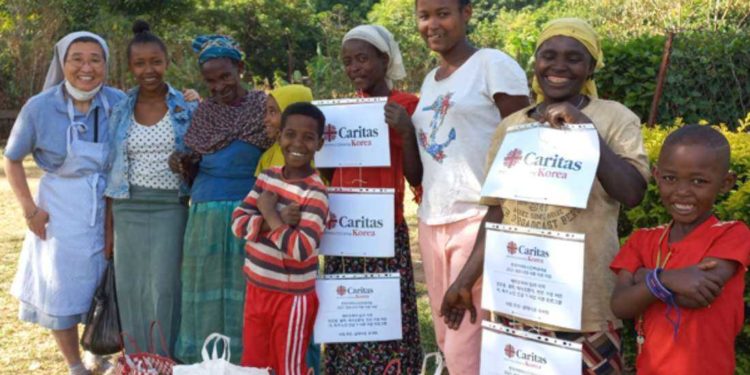A ‘receiving Church’ until the 1980s, Korean Church is on a mission of sharing in up to 20 countries across the world
A South Korean nun is seen with people in Ethiopia last February. Ethiopia is among 20 countries that get aid from Caritas Korea. (Photo: Caritas Korea)
Catholic Church in South Korea, once largely dependent on aid from foreign churches for relief, rehabilitation and development projects, is now on a mission to provide vital assistance to countries and churches around the world, church officials say.
Korean Church has been a ‘receiving church’ until the mid-1980s, and it has slowly become a ‘sharing church’ since 1992, said Bishop John Baptist Jung Shin-chul of Incheon, president of Catholic charity Caritas Korea, the Catholic Times reported on Jan. 22.
In the 1950s, when Korea was a war-ravaged country it needed aid for damage restoration, self-help development, and rural development projects that continued until the 1980s, the prelate said.


Bishop Jung made the comments as Caritas Korea International, the overseas aid agency of the Catholic Bishops’ Conference of Korea (CBCK), carries out a fundraiser campaign on Overseas Aid Sunday, the last Sunday of January.
“The scale of overseas aid by the Korean Church has increased. The bishops’ conference aims to strengthen professionalism, publicity, and transparency in overseas aid,” the prelate said.
From 2011 to 2022, Korean Church through Caritas provided aid worth 45.21 billion won (US$36.65 million) to 20 countries for 625 projects. The aid increased to 4 billion won in 2021 and 4.5 billion won in 2022 despite the setbacks stemming from the Covid-19 pandemic and war in Ukraine.
Bishop Jung says that apart from emergency relief, rehabilitation, and development projects, Korean Church supports dioceses, parishes, religious societies, and church-run organizations in various parts of the world.
This year, Caritas Korea plans to increase aid to emergency relief and long-term livelihood support projects in countries suffering from the climate crisis and conflict.
In his message on Overseas Aid Sunday, Bishop Jung said: “If we act together now, we can present a better tomorrow to our brothers and sisters.”
“Let’s act together,” he appealed.
Father Paul Choo Seong-hun, secretary general of Caritas Korea pointed out that Korean Church is on a mission to help those across the world “who cannot stand up on their own due to war, historical and geographical circumstances, etc.”
Thus, the church has been supporting refugees in Ukraine and development cooperation in the Palestinian region as major priority projects.
Since the outbreak of war in Ukraine, Catholics in South Korea generously offered donations to Caritas Korea, and a total of 711,295,864 won was raised through a special fundraising campaign from March to October 2022.
Besides, various individuals and organizations joined hands to support Ukrainian refugees. Among those are — Sharing Foundation (100 million won), Catholic Peace Broadcasting (US$100,000), Daegu Archdiocese (100 million won), Chuncheon Diocese (30 million won), Bishops’ Conference (30 million won), Korean Catholic Lay Apostolate and various Korean church organizations (15 million won).
Father Choo said he attended a Caritas Internationalis meeting in Warsaw, Poland to discuss emergency relief for war victims of Ukraine in June last year. Representatives from other countries welcomed Korean Church’s aid assistance by saying, “An Asian country that had received help in the past is now helping.”
In the Palestinian region, Caritas Korea in cooperation with Caritas Jerusalem carries out relief and development projects to provide food, drinking water, and medical support to people caught up in conflicts in the Gaza Strip and the West Bank, over the past 17 years.
Father Choo said he visited Palestine last October and paid a visit to the Gaza Strip where Caritas Korea supports a medical center for vulnerable communities. He said that in the coming days, Caritas Korea will offer assistance to single mothers and children through Caritas Jerusalem.
The priest noted that people in Gaza desperately need assistance from outside for survival.
The Gaza Strip is a densely populated place home to over 2 million Palestinians crammed in just a 45 kilometers long and 12 kilometers wide area.
The Gaza Strip is completely isolated from the outside world, and everything must be supplied from the outside to survive. Moreover, children in Gaza are exposed defenselessly to armed conflict, and due to the isolated living environment, most children need psychological treatment, the Catholic Times reported.
Caritas Korea supports a child psychological treatment center in Gaza, which helped many children to get rid of their anxiety and regain their laughter.
Caritas Korea plans to launch a new mobile clinic project for the poor in the outskirts of Gaza, who cannot receive medical treatment due to a lack of hospitals.
“During the visit, I met many people who are still waiting for help,” Father Choo said.
Latest News
Credit: Source link




